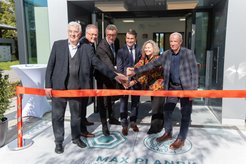News
Setting out for new possibilities
10/08/2024
Prominent guests from politics and science inaugurate new building of the Max Planck Society's Semiconductor Laboratory
On October 7, 2024, the new building of the Semiconductor Laboratory (HLL) on the Garching Research Campus was officially opened. The move from the Siemens site in Neuperlach to the Garching campus will enable the HLL to work in close cooperation with other leading research institutions.

The opening was attended by high-ranking guests such as Eric Beißwenger, Bavarian Minister of State for European and International Affairs, Professor Dr. Patrick Cramer, President of the Max Planck Society, Dr. Dietmar Gruchmann, Mayor of Garching, Professor Dr. Siegfried Bethke, former Director and Scientific Member of the Max Planck Institute for Physics, and Professor Dr. Allen Caldwell, Managing Director of the HLL. Together with Head of Laboratory, Dr. Jelena Ninkovic, they cut the ribbon for the opening ceremony.
In her speech, Dr. Ninkovic explained the function of the HLL: "Over the years, the Semiconductor Laboratory has established itself as a center for pioneering innovation. Our motto "Sensing the Invisible" reflects exactly that: we develop technologies that make the invisible visible and thus enable new insights in science."
After the symbolic act, the Managing Director of the HLL, Professor Dr. Allen Caldwell, welcomed the guests present at the nearby Science Congress Center in Garching. In his speech, he emphasized the importance of the new building and the prospect of the HLL further expanding its world-leading position in the development of silicon detectors. He also thanked the Bavarian state government and the Max Planck Society for their support in the construction of the new Semiconductor Laboratory. "The HLL has already played a key role in projects such as the XMM-Newton space telescope, the eROSITA mission and the BELLE II experiment. The new building will help us to continue this success story and expand the international relevance of the HLL," said Caldwell, underlining the important role that the Semiconductor Laboratory plays in the international scientific community.
President Cramer added: "Scientific breakthroughs are often based on technical innovations. The Max Planck Society's new Semiconductor Laboratory provides the impressive technology for the departure towards new possibilities and thus expands the attractiveness of Garching as a research location."
The Bavarian Minister for Europe, Eric Beißwenger, described Bavaria as a high-tech state: "The MPG is one of the absolute world leaders in basic research and is a Nobel Prize winner's forge. The new Semiconductor Laboratory turns basic research into concrete applications. With its far-sighted regionial policy, the Free State of Bavaria is creating the best conditions for research and development and is playing in the scientific Champions League. Bavaria attracts to the brightest minds worldwide. This is also demonstrated by the establishment of the new Semiconductor Laboratory at the Garching research campus. With the High-Tech Agenda, we are investing 5.5 billion euro in science and research. Research and innovation are the key to the future and at the same time form the basis for economic success."
The Semiconductor Laboratory is known for its state-of-the-art silicon detectors, which are used in many research projects, including X-ray astronomy and particle physics. With the new building, the lab will have 1,500 square meters of modern laboratory space, including 600 square meters of ISO 3 class clean room. This highly specialized equipment will allow it to install an 8-inch process line and develop new technologies for nanofabrication. The HLL will also play a central role in the Munich Quantum Valley and thus have a lasting influence on the development of quantum computers.
The opening ceremony concluded with scientific lectures by leading experts such as Professor Dr. Kazunori Hanagaki, Director of Research and Deputy Director General of the Research Organization for High Energy Accelerators (KEK) and Professor Dr. Günther Hasinger, Founding Director of the German Center for Astrophysics and former Director at the Max Planck Institute for Extraterrestrial Physics. The day after the opening, a scientific symposium was held, bringing together international experts on the subject of silicon sensors and their applications.
